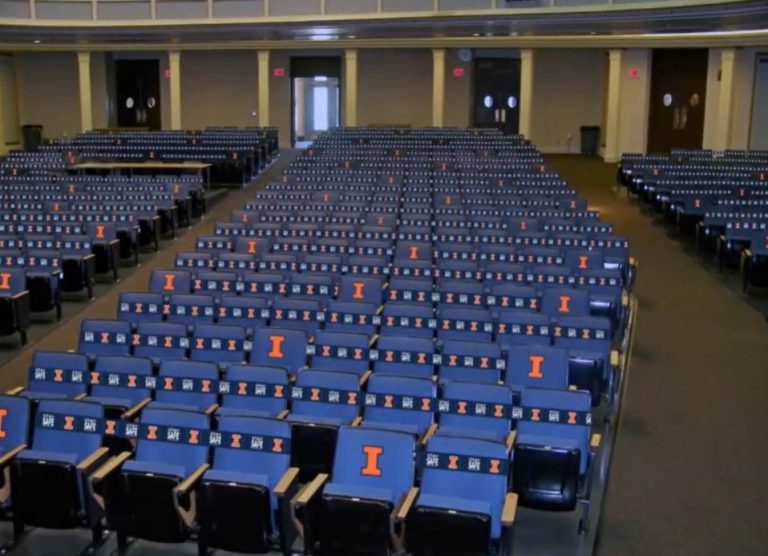URBANA – University of Illinois officials released more details Monday about what the fall semester will look like on its Urbana campus.
During a webinar hosted by U of I staff on Monday, Brian Brauer, associate director of the Illinois Fire Service Institute, broke down the university’s actions to prevent the spread of COVID-19 into four categories: screening and testing students and employees for the virus, hand washing, blocking droplets through the use of face masks and other barriers, and social distancing inside campus buildings.
“And there’s no guarantee that if we do all of these things we may not contract the virus,” Brauer said. “But by doing as many of these as practical… it’s going to lower our risk as much as possible. We can’t take it to zero. But if we all work together, and follow as many of these as possible at every opportunity, we’ll keep that risk to a minimum.”
Brauer said the best data suggests the virus is spread by droplets.
“That’s why wearing a face covering is so critical,” he said. Brauer added that instructors may not be able to wear masks in the classroom, because doing so could muffle their speech, or a student may need to see them speak in order to understand what’s being said.
“Blocking droplets may take the form of putting up plexiglass barriers, or other dividers so that individuals don’t share their droplets,” he said.
Mohamed Attalla, executive director of Facilities & Services at the U of I, says they expect to operate buildings at about 30% of their normal capacity in order to maintain six feet of distance between students in classrooms and hallways. He said smaller hallways may be turned into one-way corridors to maintain social distance. Cleanings of restrooms will be increased from once to twice daily, hand sanitizer dispensers will be located near the entrances of all campus buildings, while disinfecting wipes will be available inside classrooms, Attalla said.
“We did an estimate of… the required disinfecting wipes from now until the end of December, and we came up with a number of 11 million disinfecting wipes,” Attalla said. He added that the university has 1.5 million wipes on hand and another 6 million on order. Attalla said the university has about 4,000 gallons of hand sanitizer in its inventory as well. Brauer said one of the campus’ labs was adapted to produce hand sanitizer.
Attalla said the university has also worked with its unions to ensure that employees can conduct supplemental cleaning of their work environments.
For example, disinfecting conference rooms before and after meetings, cleaning shared vehicles before and after their use, cleaning shared spaces like break rooms and coffee stations, and disinfecting reception areas before and after visitors come to campus buildings are all activities that can be performed by faculty, staff and student workers, Attalla said. He added that facilities and services employees installed roughly 11,000 signs across campus indicating COVID-19 safety and social distancing guidelines.
Kristin McMurray, an associate registrar for the U of I, said staff are working on classroom layouts that would allow for social distancing between students and professors. For example, she said classrooms in Lincoln Hall that previously held 49 and 28 students, respectively, would now be able to accommodate only 16 and 10 students at a time. She says they’re calculating maximum occupancy levels for 400 traditional classrooms across campus.
“Now, many of these (classrooms) may not be used at the end of the day, but we still have to go through this exercise and identify the number of seats we can get for each of those spaces,” McMurray said.
She said staff is working closely with each unit to determine what classes need to be held in-person, and then exploring scheduling options for those classes.
“For example, instructors could choose to have an attendance plan, so a portion of the class comes on certain days or certain weeks of the semester on a rotating basis,” McMurray said. She added that the university is also looking at hosting classes from as early as 8 a.m. up until 10 p.m. “so that we can really find space for as many in-person classes as possible.”
Matthew Tomaszewski, a U of I associate provost, emphasized the importance of personal responsibility when executing these measures.
“It’s up to each one of us to follow all the guidelines. From wiping down your shared surfaces to social distancing — even when it’s awkward — washing your hands, using hand sanitizer. We need to do it for ourselves, but we also need to do it for one another,” he said.
Follow Lee Gaines on Twitter: @LeeVGaines

